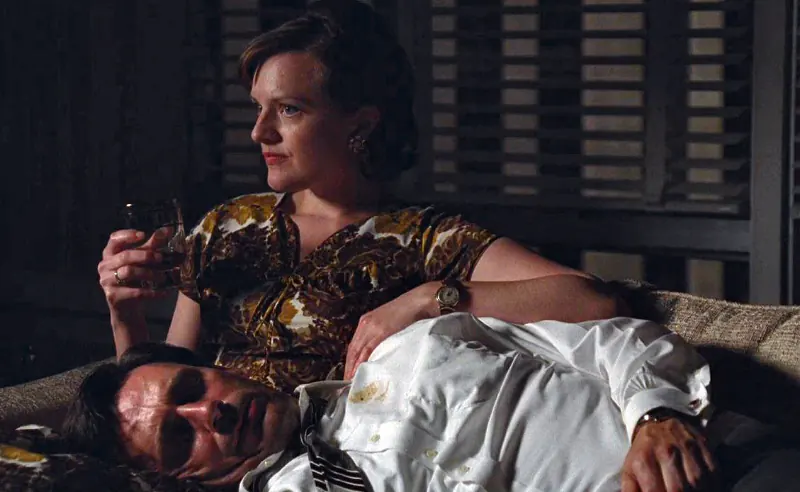Draper & Peggy In "The Suitcase" Episode
The feeling of emptiness after the end of Breaking Bad didn’t last for long as I had five seasons of Mad Men to catch up. Mad Men’s period world of lies and addictions immediately sucked me and I realised no TV series or even feature film had ever captured me with so much and such consistent visual splendour. But this would be ignoring the show’s real strength under the gorgeous 60’s veneer.
From the same house as Breaking Bad, Mad Men is in fact the first original drama series AMC ever produced, after Matt Weiner’s pilot was rejected by HBO and Showtime. Coming fresh out of Breaking Bad it was hard for me not to compare the two and at its centre Mad Men also follows one single character whose morality is debatable by today’s standards. Conceptually though, the two shows couldn’t be further apart.
DRAPING BAD
Unlike Breaking Bad, where the main character has a clear, specific outer goal from the pilot episode, here we have an open-ended dramatic question along the lines of ‘How far will Don Draper go to protect his secrets?’ Those secrets in turn are related to the central thematic question: Who is Don Draper? Soon we sense that he is a man whose mythical name hides a murky past and a mistaken identity. Where the plot may not be clearly defined, thematically few television series have been this powerful and - here’s that word again - consistent.
Season 4 is set mostly in the birth year of Mad Men’s creator (and this article’s writer), and opens with restating the thematic question, then deepening into what becomes the strongest season of the show. Everything from the preceding seasons prepared us to see how all characters (and by association our entire society - and we ourselves) are shaped by the actions of their parents.
WHO IS DON DRAPER?
This season is all about loss and death, cracking the characters’ fragile outer identities and uncovering their devastating inner conflicts to the outside world. Don is coping with the loss of his marriage, which materialised his primal fear of being abandoned by those who get to know his secrets. Don’s elderly secretary Ida Blankenship drops dead at her desk, Joan has an abortion after temporarily re-igniting her affair with Roger, and Lane is humiliated and abused by his elderly father. This last scene is terrific and terrifying, as it shows us an echo of the flashbacks with Don’s father. Finally, Roger loses the Lucky Strike account, upon which he had built his entire identity - and the whole company.
Where initially I believed Matthew Weiner had created an anomaly, a series that broke with all structural conventions, the inner Hero’s Journey of this series becomes increasingly apparent. With Season Four we are past the mid point and Don is approaching his Inmost Cave. This season may well be Mad Men’s darkest; it is undoubtedly the strongest, as it finally brings the real Don Draper / Dick Whitman to the surface.

THE ORDEAL MOMENT - LIFTING THE VEIL
In the Suitcase episode - one of only three in this season written exclusively by Weiner - Don is asked to return a phone call but he can’t. He senses that Anna Draper, the widow whose husband’s identity he took over, may have passed away. She was the woman who knew him better than anyone, and who despite her own predicament and Don’s lies, still accepted him for who he was. She was the closest Don ever knew to a mother. Her passing becomes a deeply metaphorical image that allows Don to mature and heal an important childhood scar. Just before waking up, he sees the image of Anna leaving, while holding a suitcase. Next, Don wakes up with his head on Peggy’s lap, the only other woman who has a fairly good sense of who he really is. Now he is ready to make the call and he hears from Stephanie that Anna did indeed die. Don sits with Peggy, and for the first time in more than thirty hours of brilliant television, he lifts the drapes. In a moment of complete vulnerability, Don Draper breaks down in tears. When a TV series of this depth can be among the most successful on cable television in the US, I believe there is hope for humanity.
Karel Segers
Karel Segers wrote his first produced screenplay at age 17. Today he is a story analyst, script editor and producer with experience in rights acquisition, script development and production. His
screenwriting classes have trained writers in Australia, Europe, Asia and the Middle East, and his clients include international award-winning filmmakers as well as three Academy Award nominees.
Karel is the founder of
The Story Department and he ranks in the world's Top 10 of most influential people for screenwriting on Twitter.